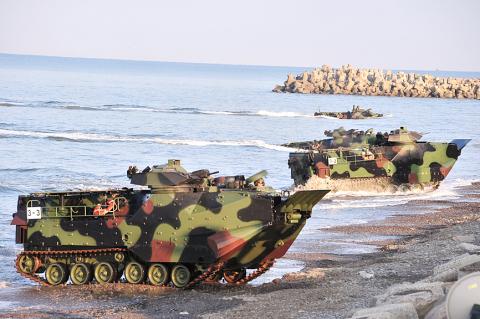Deliveries of US amphibious assault vehicles have been delayed, with supplier the US military citing technical difficulties.
In a bid to improve the nation’s amphibious assault capabilities, 36 AAV-7A1s were purchased from the US, with the first shipment to arrive in the second half of this year and the remainder to be received by the end of 2019.
Sources said that even though payment for the first shipment has been sent, the vehicles are to be delayed until 2020.

Photo: Tsai Tsung-hsien, Taipei Times
One source said the military has been in contact with the US in an attempt to resolve the situation, expressing concern that LVTP-5 amphibious vehicles in service have exceeded their useful life and that continued use would compromise Taiwan’s amphibious assault capabilities, but the US has remained resolute in its position.
The US cited technical difficulties for the delay, saying that it is waiting on other orders.
Military officials said they had settled the issue with the US in 2013, adding that the delay might be because of a political issue.
“The AAV-7A1 plays a pivotal role in modern amphibious warfare. Whether in defense of the perimeter of the Pratas Islands [Dongsha Islands, 東沙群島] or Itu Aba Island [Taiping Island, 太平島], in a mission to safeguard Taiwan’s southern coast or the outlying islands of Kinmen and Matsu, or even in conducting rescue missions following major natural disasters, the AAV-7A1 plays a crucial role,” the source said.
“Delaying shipment of the 36 vehicles will be a major blow to the military’s ability to maintain combat readiness,” the source said.
Navy Command Headquarters yesterday said that “because the US has to conform to a production schedule that allows it to complete several orders simultaneously, shipments will be postponed.”
The navy said that the shipment would be accomplished in two installments, with 24 units arriving in 2020 and the remainder in 2021, adding that it would make amendments to its investment network because of the delay.
The navy has used the LVTP-5 in amphibious landing exercises, but as the vehicles are beyond their service lifespan, finding replacement parts has become increasingly difficult.
In 2006, the navy commissioned the US to produce 54 AAV-7A1s to replace its outdated fleet.
A military official said that although it has already procured 54 AAV-7A1s, that is far from its target, which is to procure 36 more.
The navy plans to use four of the AAV-7A1s as command vehicles, while two are to be assigned for use in disaster relief operations.
The official said the 36 vehicles cost NT$5.3 billion (US$165.26 million), with the purchase contract signed by both sides on May 12 and funds transferred on June 24.
“It was completely unexpected that the US would suddenly announce a three-and-a-half-year delay. The sudden, unexpected nature of the decision was a great shock to the military — we are unable to accept this turn of events,” the official said.

PREPAREDNESS: Given the difficulty of importing ammunition during wartime, the Ministry of National Defense said it would prioritize ‘coproduction’ partnerships A newly formed unit of the Marine Corps tasked with land-based security operations has recently replaced its aging, domestically produced rifles with more advanced, US-made M4A1 rifles, a source said yesterday. The unnamed source familiar with the matter said the First Security Battalion of the Marine Corps’ Air Defense and Base Guard Group has replaced its older T65K2 rifles, which have been in service since the late 1980s, with the newly received M4A1s. The source did not say exactly when the upgrade took place or how many M4A1s were issued to the battalion. The confirmation came after Chinese-language media reported

The Taiwanese passport ranked 33rd in a global listing of passports by convenience this month, rising three places from last month’s ranking, but matching its position in January last year. The Henley Passport Index, an international ranking of passports by the number of designations its holder can travel to without a visa, showed that the Taiwan passport enables holders to travel to 139 countries and territories without a visa. Singapore’s passport was ranked the most powerful with visa-free access to 192 destinations out of 227, according to the index published on Tuesday by UK-based migration investment consultancy firm Henley and Partners. Japan’s and

A Ministry of Foreign Affairs official yesterday said that a delegation that visited China for an APEC meeting did not receive any kind of treatment that downgraded Taiwan’s sovereignty. Department of International Organizations Director-General Jonathan Sun (孫儉元) said that he and a group of ministry officials visited Shenzhen, China, to attend the APEC Informal Senior Officials’ Meeting last month. The trip went “smoothly and safely” for all Taiwanese delegates, as the Chinese side arranged the trip in accordance with long-standing practices, Sun said at the ministry’s weekly briefing. The Taiwanese group did not encounter any political suppression, he said. Sun made the remarks when

BROAD AGREEMENT: The two are nearing a trade deal to reduce Taiwan’s tariff to 15% and a commitment for TSMC to build five more fabs, a ‘New York Times’ report said Taiwan and the US have reached a broad consensus on a trade deal, the Executive Yuan’s Office of Trade Negotiations said yesterday, after a report said that Washington is set to reduce Taiwan’s tariff rate to 15 percent. The New York Times on Monday reported that the two nations are nearing a trade deal to reduce Taiwan’s tariff rate to 15 percent and commit Taiwan Semiconductor Manufacturing Co (TSMC, 台積電) to building at least five more facilities in the US. “The agreement, which has been under negotiation for months, is being legally scrubbed and could be announced this month,” the paper said,